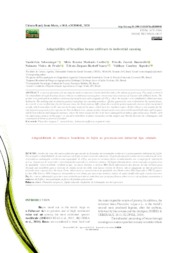Adaptability of brazilian beans cultivars to industrial canning.
Adaptability of brazilian beans cultivars to industrial canning.
Author(s): SCHOENINGER, V.; COELHO, S. R. M.; BASSINELLO, P. Z.; PRADO, N. V. do; SOARES, T. Z. B.; SIQUEIRA, V. C.
Summary: A current alternative for meeting the modern consumer?s beans food demands is the industrial processing. This study evaluated the adaptability of eight Brazilian beans cultivars to industrial canning from commercial class cultivars of Carioca and of Black beans. The grains were processed in an industry sector using metallic cans with a capacity of 420 g, where the samples were conditioned without previous hydration. The cooking and sterilization process took place in a rotating autoclave. Quality parameters were evaluated in the canned beans. As a result, it was verified that, for the Carioca class, the Estilo cultivar differs from the rest of the genetic materials in terms of its low drained weight, which contributes to the increase in the total solids in the sauce, which have low hardness values. Estilo cultivar is not suitable for the type of processing used in this experiment. For the Black class, similar quality characteristics were observed between Esplendor and Uirapuru and between Esteio and Campeiro cultivars, where the latter stands out due to its lower damaged bean indices after processing. Finally, with the information present in this paper we intend to contribute to future researches on this subject and thereby increase the consumption and exportation of beans as processed product.
Publication year: 2020
Types of publication: Journal article
Unit: Embrapa Rice & Beans
Keywords: Alimento Enlatado, Beans, Canned foods, Cor, Feijão, Industrial crops, Phaseolus Vulgaris, Tegumento
Observation
Some of Embrapa's publications are published as ePub files. To read them, use or download one of the following free software options to your computer or mobile device. Android: Google Play Books; IOS: iBooks; Windows and Linux: Calibre.
Access other publications
Access the Agricultural Research Database (BDPA) to consult Embrapa's full library collection and records.
Visit Embrapa Bookstore to purchase books and other publications sold by Embrapa.

